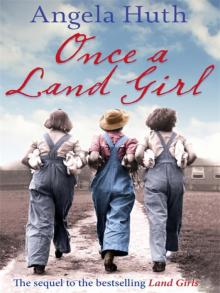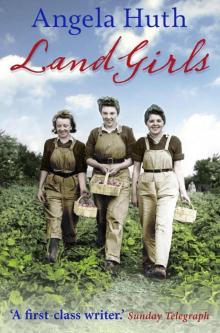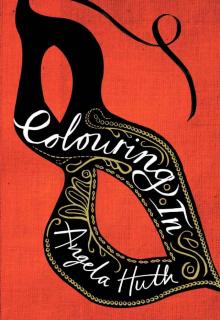- Home
- Angela Huth
South of the Lights
South of the Lights Read online
ANGELA HUTH
South of the Lights
‘I did not know
That heydays fade and go,
But deemed that what was would be always so.’
Thomas Hardy
Contents
PART I
PART II
Part I
Chickens, thought Evans. Bloody chickens. Their pernickety clucking had become a background to his life. Sometimes, good days, he could tolerate them. They reminded him of the years ahead, the house he and Brenda would have, the strip of garden at the back, the hen-house and run he would make for them. They would be free-range birds, of course, and lay brown eggs which Brenda would gather in a basket. Other times, in the dim smelly shed where he and Brenda seemed to spend so much of their time, he felt like putting a bomb to the place. He felt like blasting for ever their mouldy feathers and indignant red eyes and peevish chatter. Oh, he was sorry for them all right. But God, he hated them too. Today, he’d make sure to stay outside the shed. Today they’d get on his nerves.
Evans walked through the farmyard, May sun hot through his shirt. It hadn’t rained for two weeks. His feet made small clouds of dust rise from the dry dirt track. He sniffed the rank smell of animals and manure. Brenda would like an hour off for lunch, he thought. Or perhaps she wouldn’t. She was unpredictable like that. But just in case, he had bought two pork pies and cans of beer. It would be nice to sit in the field behind the sheds and eat in the sun. There, the farmyard smells were less strong.
He turned the corner. A hundred yards ahead stood the familiar hulk of tarred sheds where Wilberforce’s chickens lived, laid and died. Brenda’s territory. She leaned against the door, one knee bent, heel lodged behind it on some rough piece of wood. Her head was tilted towards the sun, eyes closed. A lighted cigarette drooped between her fingers. She raised her hand slowly to her mouth and inhaled, without opening her eyes.
Evans felt a swarm of love for her, giddying his head. He moved faster. She would not hear his step in the soft earth. He would surprise her. She might be pleased. A few feet away from her he stopped to anticipate her pleasure, and to enjoy the sight of her before she became aware of his presence. She was wearing his favourite shirt: cream cotton covered with a pattern of chicks breaking out of their shells. Beneath the crowd of chicks her breasts rose and fell with her slow, even breathing. Last night they had overflowed from Evans’s hands. She had shouted to him to be careful: the straw was scratching her something awful, she had said, and he had silenced her shouts with his mouth. Evans swallowed. No matter how good the night had been, he always felt uncertain how to approach her in the morning.
‘Brenda,’ he said.
She opened her eyes, turned her head slowly towards him, leaving it tipped towards the sun so that her chin was a defiant point.
‘Oh, it’s you.’ No surprise in her voice. She puffed at her cigarette again. Evans allowed himself to be dazzled for a moment by the sparkling ring on her fourth finger, a small pink stone which, on less bright days, faded disappointingly.
‘You smoking again,’ he said. ‘You’ll cop it if Wilberforce catches you.’
‘Wilberforce can’t tell me what to do, I’ve got the sense to be careful, haven’t I? Not likely I’m going to set his bloody ricks on fire.’
‘But he said you’d get the push next time.’
‘What would I care about that?’
‘You’d miss the hens.’
Brenda flung her cigarette stub on to the ground. It landed beside Evans. He squashed it with his foot, buried it with the dusty earth.
‘There are plenty of other hens.’
Evans felt an explosion of gunshot beneath his ribs. Its reverberations quickened the pace of his heart. He stepped towards her, roughly pulled down her chin between his thumb and finger, and kissed her.
‘Don’t be daft,’ he said, the words smudged by her lips. She smelt of corn. Sometimes, evenings, when they went to the cinema, she would dab herself with lavender water or essence of bluebell, which her mother sent from Birmingham every Christmas. But the scent always wore off very quickly and gave way to the essential corn smell of her skin which, as Evans often said, made him feel drunker than a dozen double whiskies.
‘Leave off,’ said Brenda, pushing him away. ‘It’s too hot.’
‘Just feel my heart.’
Brenda put her hand to his heart.
‘You and your heart. You might as well give up if your heart didn’t beat faster sometimes.’
Evans smiled, causing his drooping left eyelid to sag until it almost covered his eyeball. Moonlight nights in the barn, Brenda said it was his funny eye that made her feel sexy. In bright sun, he noticed, she often looked away from him, or concentrated on his mouth or other eye. So by day he had learnt to restrict his smiles.
‘I brought us a bite to eat,’ he said, flourishing the paper bag. ‘I thought we might need it after . . .’
‘After what?’ Brenda was in a teasing mood.
‘After all that. I’m shagged, myself.’
‘Are you? I’m fine. Quite hungry.’
‘We could go and sit in the field.’
‘I like it just standing here.’
‘We can’t eat just standing here.’
‘Don’t see why not, pork pies.’
‘How d’you know I’ve brought pork pies?’
‘You always do, don’t you?’
Evans’s voice dropped.
‘Sometimes I bring the steak and kidney, don’t I? They were out of them today.’ He handed her the bag. She took one of the pies. Its greasy pastry had a whitish sheen. They ate standing up.
‘How’s the post office, then?’
Every day, Evans dreaded the question. Manager of the village’s sub post office had not, in three years, turned out to be the job he had once expected. It was devoid of both interest and excitement. Promotion had not come his way and indeed, now Brenda was his life, in some ways he would not relish it: to be transferred to the local town would add to complications. Privately, Evans went so far as to pray for a hold-up. If such a thing took place he would act with commendable cool and bravery. He had rehearsed it many times in his mind, and he longed for it with a force that surprised him. For nothing less than a masked gunman would flame Brenda’s interest in his job. Nothing less than near death would transform Evans into her hero.
‘Quite a few parcels for the time of year.’
‘Perhaps they’re posting early for Christmas.’ She said it in a lifeless tone. Only twelve hours ago, Evans found himself thinking, her voice had been husky, musical with desire. The remembrance brought a chill to his brow.
‘Perhaps they are,’ he said. ‘But I wish there was more exciting news for you. I just seem to sit behind the grille, day after day, waiting for the next centenary stamp to brighten my life.’
Brenda shrugged, smiling. Sometimes, when he didn’t try, the most unexpected things would make her smile.
‘Elizabeth’s not laying,’ she said. ‘Would you like to take a look at her? She looks right down.’
‘No, I wouldn’t, really. Not if you don’t mind.’
‘I told Wilberforce last week she was seedy, but he said don’t be so stupid, he could tell a mile off when a bird was seedy. So now this afternoon I’ll have to tell him she’s not laying and he’ll say: so what? The bird’s not laying. Floribunda’s going to be the next one. But I shan’t say anything. He can find out for himself if he knows so much.’
‘Wilberforce got a birthday coming up soon?’
‘Not that I know of. Why?’
‘Mrs Wilberforce was in this morning. Took twenty minutes choosing a card. Landed up with a picture of a bowl of hyacinths, a bit of real satin ribbon round the bowl
and Happy Birthday Dearest Love inside. Been in the place six months. Thought I’d never get rid of it.’
‘Now that is news.’ Brenda shifted her position. ‘That wouldn’t be for Wilberforce. That would be for the man she’s seeing in Luton. Sees him every week, says she’s visiting her cousin.’
‘You know everything,’ said Evans.
‘I just hear without meaning to. Doesn’t mean anything to me.’ Brenda sighed, put her hands in the pockets of her jeans, stood with legs astride. Evans found the stance irresistibly provocative. He looked away.
‘Come on,’ Brenda sighed. ‘Let’s have the beer then I can get back to grading the eggs.’ She had a curious way, on occasions, of sounding dismissive. Evans opened a can. The froth spurted out, spilling on to the ground, splattering the dark earth with deeper spots. He handed it to her, the liquid running over his wrists, his hand shaking.
‘Wilberforce not bothering you any more, is he?’
‘Wouldn’t be worth his while, again, would it? I keep out of his way. He makes me sick.’
‘I’d kill him if he laid a hand on you,’ said Evans.
‘No you wouldn’t. You wouldn’t kill a worm.’
‘He’s a bastard.’
‘He’s not worth bothering yourself about. He knows he doesn’t stand a chance with me.’
‘He better not try.’
‘Oh, he won’t, Evans. Do stop going on about Wilberforce.’
Evans watched the beer running down Brenda’s chin. She had never learnt to drink properly from a can. He passed her his handkerchief.
‘What would you like to do tonight?’
‘Tonight?’
‘You could come over to my place.’
‘Not if it’s your Dad’s night in. I couldn’t face your Dad, not tonight I couldn’t. Besides, I want to wash my hair. Lark said she’d do it for me.’ She put her hand behind her back and opened the door to the shed. At once the clatter of hens, which until now had been a subdued murmur, swelled to irritate Evans’s ears.
‘It’s all very unsatisfactory,’ he said, ‘this not having anywhere to go.’
‘Well, we’re saving, aren’t we?’
‘We’ve been saving two bloody years, and we don’t seem much nearer. If we had somewhere of our own, it’d be easier.’
‘I’m not complaining.’
‘Sometimes you sound as if you don’t care.’
‘No point in being impatient, is there?’
She pushed the shed door further open. Through the mottled light inside Evans could just discern the stacked coops, the pathetic heads and claw-like beaks that jerked from each one of them. If he stayed one moment longer Brenda would persuade him in to see Elizabeth.
‘I’ll pick you up this evening, then,’ he said.
‘I told you I was washing my hair, didn’t I?’
‘I’ll pick you up and run you home in the car.’
Brenda took a packet of Woodbines from the pocket of her jeans. ‘And shut up your nagging, Evans, will you?’
‘I didn’t say a thing.’ His hands tightly clenched, one on each empty beer can.
‘You get at me with your looks as bad as words. You’d better get back to sorting your parcels.’ She turned and went into the shed. Her body at once shed its skin of light, became submerged in shadow, speckled and untenable as a trout under water. Evans walked back up the dirt track, uneasy in the heat. Three and a half stifling hours behind the post office grille before he could return to her, and, in the brief drive to her flat, try to find out what he had done wrong.
Rosie Evans pushed her wheel basket of groceries up the mild hill to the cottage in which she and Henry had lived all their married life, thirty-eight years. It was one of a row of thatched and beamed cottages adjacent to the church, the last remaining part of the original village. Since Rosie’s childhood some fifty similar dwellings had fallen into a state of irreparable decay and been pulled down. They were replaced by a growth of ill-conceived contemporary houses which architects wrongly imagine are desirable: sour red brick, identical bubble-glass front doors and cement front paths. The kind of houses Rosie supposed might be all very well in a New Town, but were quite out of place in what once had been a small and pretty village. Even the old vicarage had been demolished. (No one could claim it was the best of Victorian architecture, but it had had thick Virginia creeper, and a lovely front porch, as Rosie and Henry knew from experience, for courting.) It had been replaced by a flat-roofed brick box, whose windows, which flowed from roof to ground, seemed to have been designed to expose the vicar’s entire private life. His wife, although supporting her husband in the theory that a shepherd should always be available to his sheep, felt that this kind of availability was going too far. Her first week at the new vicarage was spent sewing old surplices together to form some measure of protection. These, she explained, would be no ordinary curtains: more, a kind of religious mist clinging permanently to the windows. The vicar saw light. They would add a mystical air to his movements, he thought, and he was able to rejoice.
Rosie, whose eyes could never be intent upon so ugly a building as the vicarage, glanced instead up at the three tall elms which grew in a triangle where the lane to the church and cottages petered out. They were still healthy. One day, no doubt, they would be stricken by the fatal disease, and have to be pulled down. Rosie hoped they would last her lifetime. She knew them well, in all seasons, and loved them. Every new demolition in the village had saddened her. Had it been ruined twenty years ago, she and Henry might have considered moving away. But its final devastation had only taken place within the last few years, and now they were too old to move. Besides, from the rooms of the cottage their small views had not changed: at the back, the graveyard, at the front the elms and the mossy green fence that surrounded the grounds of Wroughton House. So they were lucky, really. Lucky compared with Evans and Brenda, who would be forced to the wicked expense of buying a new place. Still, according to Brenda – and Rosie could understand – young people preferred bland walls with no beams, and all the conveniences of a modern building. She and Henry would leave the cottage to Evans, of course, but he wouldn’t want it. He would sell it and spend the money improving his own house – if by then he had managed to buy one. She hoped he would be happy.
Rosie, whose sympathies were universally available, spent a considerable part of her life wishing for other people’s happiness. She herself was embalmed in a contentment she had woven for herself, and made inextricable. Her own pleasures were simple, added to almost daily, while the pleasures of people around her, and people on television, added to the web of satisfaction. But she was not complacent. Aware that happiness is inevitably a precipice at the edge of an abyss, she regarded the good fortune of her life as something to be banked, and called upon to fortify if and when the fall came. She had a recurring nightmare that Henry, whose only skittishness became apparent in his fourteen-year-old Morris Minor, would one day be mangled in a car crash. She had been prepared for the tragedy for years. When it came she would be able to cope. She would recall that she had had thirty-eight loving years with Henry, more than the fair share of most human beings, and surely the grateful knowledge of that would help ameliorate the loss.
Meantime, the act of loving her husband had its positive rewards, even if they were not always in abundance. He had never been the easiest of men, but in him Rosie recognized a challenge to which she rose with most persistent enjoyment. She had learnt two very good tips from her own mother on how to provide a husband’s pleasure: always have something warm in the oven, and never cease to welcome him. Lately, since the stability of Henry’s teeth had been causing some concern, his unexpected appetites for a hot pie at odd times of the day had declined. Now, he was happier to suck gently at a ginger biscuit and, accordingly, Rosie had cut down on her baking. But in relinquishing one of her stable methods of assuring love, Rosie found herself doubling her efforts when it came to the other. In this, their peaceful retirement, her welcomes
to Henry flourished. Even now, as she paused to enjoy the great yellow-green spread of the elms’ branches, Rosie chided herself. She had been dawdling. Henry, sitting by the small coal fire, would have finished the Daily Mirror. He would be wondering where she was, missing her. She pushed at the handle of her wicker basket, impatient with herself. In the few yards left to the front door she pondered upon today’s greeting, a fresh way to assure Henry that all was well, that here she was, back again.
Henry Evans was exhausted by his wife’s welcomes. He sat in his armchair by the fire bracing himself for Rosie’s return, relishing the last few moments of peace. Any moment these would be shattered by her kind smiles and eager questions and hopes for his well-being. Over the years he had learnt that to respond to her benevolence merely led to further, wearying counter-response. In self-defence he had become a taciturn man, only speaking if it became necessary to further the plot of his life. Which was not, as he had been reflecting this afternoon behind the Daily Mirror, a very exciting life. Nor had it ever been. In sixty-five years nothing surprising had happened: except for one wild storm in the Bay of Biscay, in his Navy days, he had known neither drama nor fear. He could have done with a few more storms. The murderous waves had raced his blood, somehow, giving him energy and adrenalin which had lasted for a year or so, then faded, leaving him dull to himself again. It was in his year of exuberance that he had married Rosie, a pretty young thing then, in spite of her hands. In those days he had been equal to her energy. But as the benefits of the storm receded, he found himself no match for her. She had been a tiringly good wife for thirty-eight years, and wasn’t likely to change her loving ways now. In retirement, her cocoon of benevolence was particularly claustrophobic. There were so few chances, or reasons, to get out. Saturdays and Tuesdays he went to the pub, alone, because Rosie was of the opinion beer and darts were men’s things, and she’d want no one to accuse her of pushing herself into a man’s world, making a nuisance of herself where she might not be wanted. Mondays and Fridays he went to the local ironmonger for a couple of hours to look through the books. He’d always been good with figures, and he liked the small, stuffy back office where he was put to work with a mug of strong tea. He liked the smell of nails and potash and rubber plugs, and the half-dozen inevitable interruptions from Mr Daly, his boss, who had a lively line in complaints about what the Government was doing to his shop. In spring, Henry would sometimes try to escape for a walk in the bluebell woods, up on the hill, where he would listen to the thrushes and smoke his pipe. But however unadventurous he tried to make his proposed walk sound, Rosie would not be taken in. Undaunted by his warnings of wasps, stinging nettles and all manner of unexpected hazards, she would often insist on coming too. She would enjoy the walk with an energy that made Henry’s heart retract into an impenetrable shell, and he would make no word of response to her reminiscences of times past when in their youth they had picnicked – and more – beneath these very trees.

 Sun Child
Sun Child South of the Lights
South of the Lights Virginia Fly is Drowning
Virginia Fly is Drowning Of Love and Slaughter
Of Love and Slaughter Such Visitors
Such Visitors Once a Land Girl
Once a Land Girl Land Girls
Land Girls Colouring In
Colouring In Nowhere Girl
Nowhere Girl Monday Lunch in Fairyland and Other Stories
Monday Lunch in Fairyland and Other Stories Another Kind of Cinderella and Other Stories
Another Kind of Cinderella and Other Stories Invitation to the Married Life
Invitation to the Married Life Easy Silence
Easy Silence